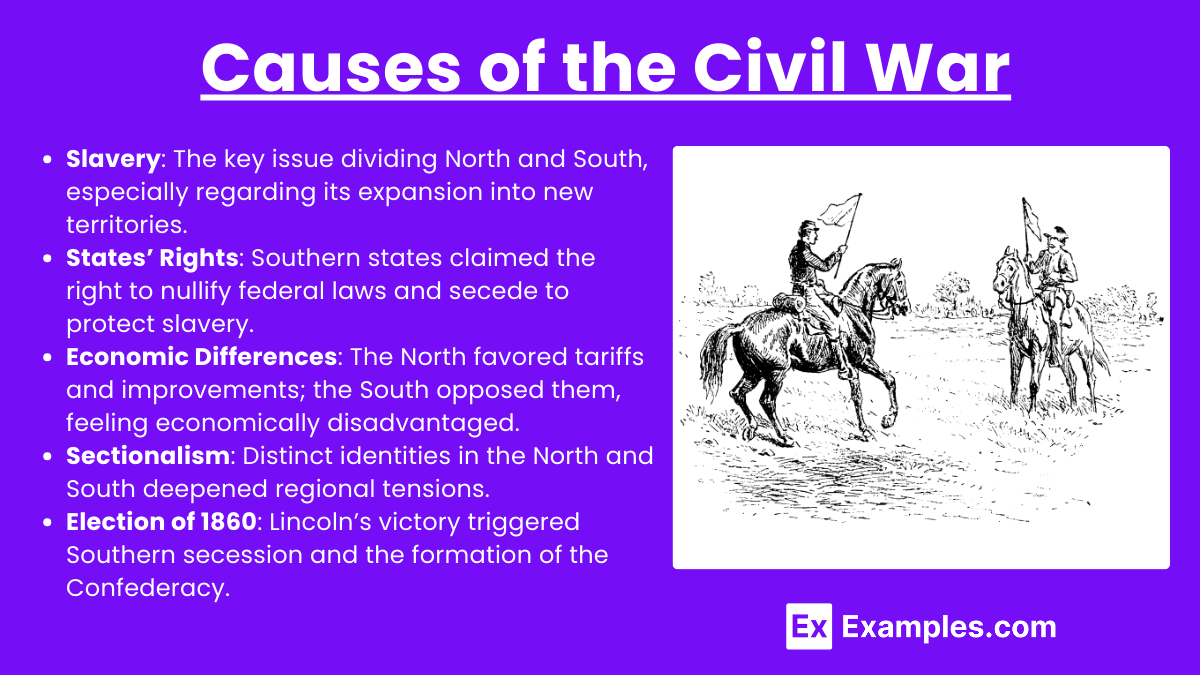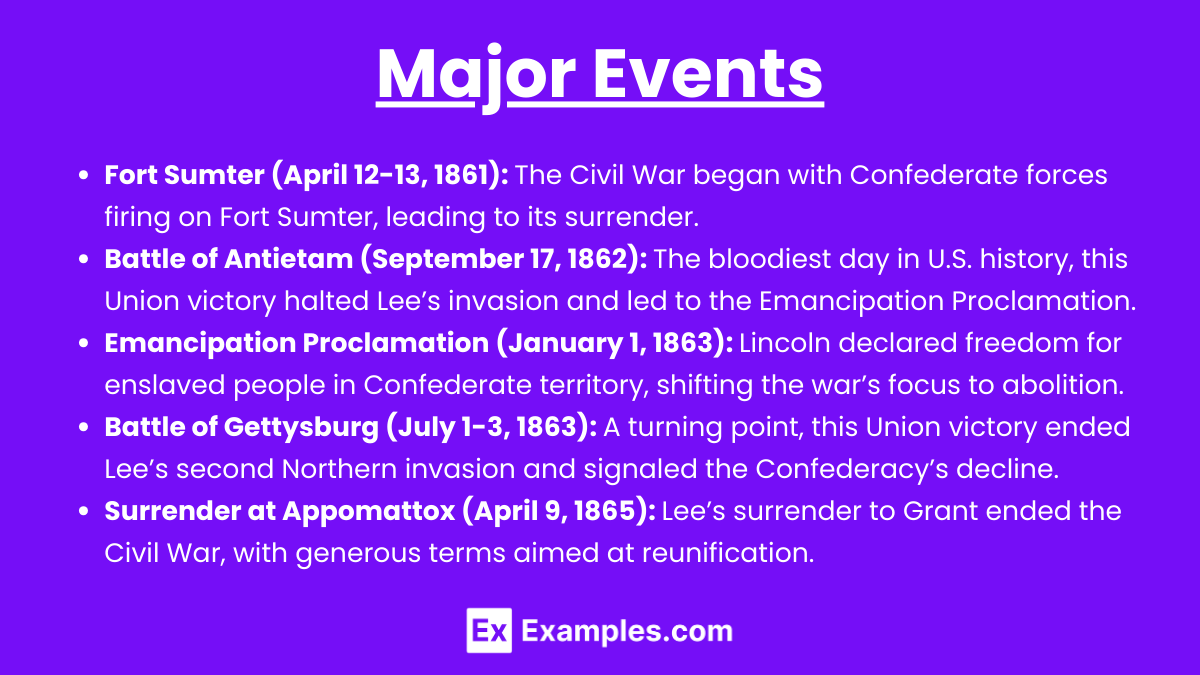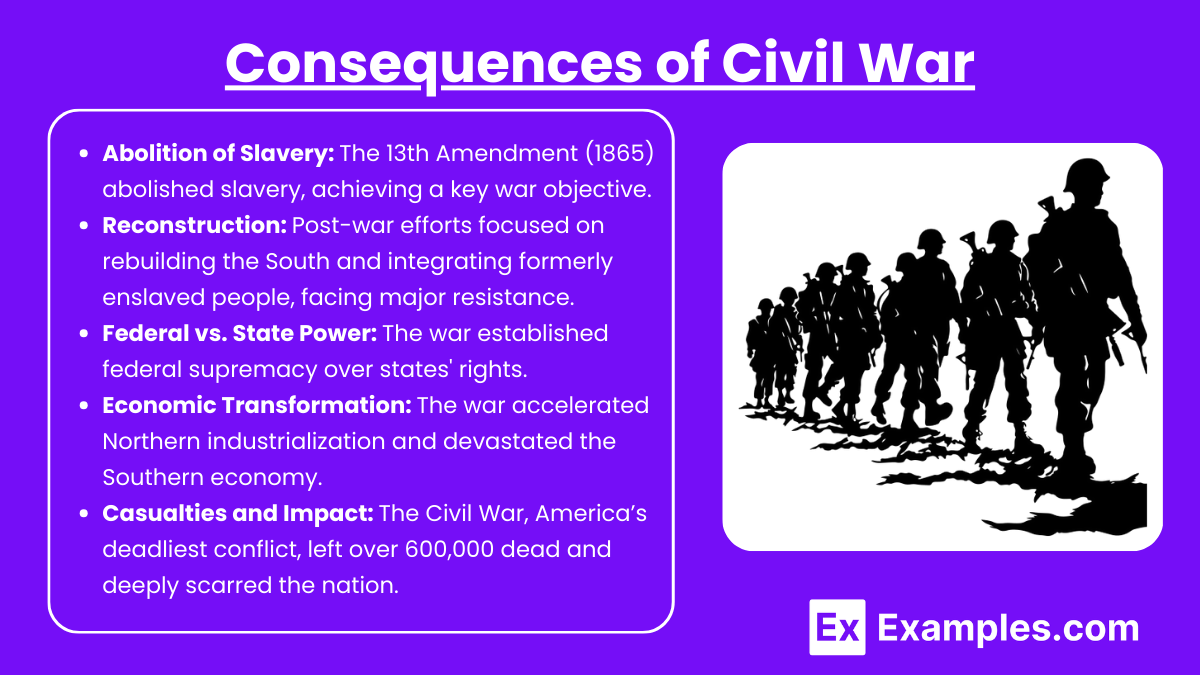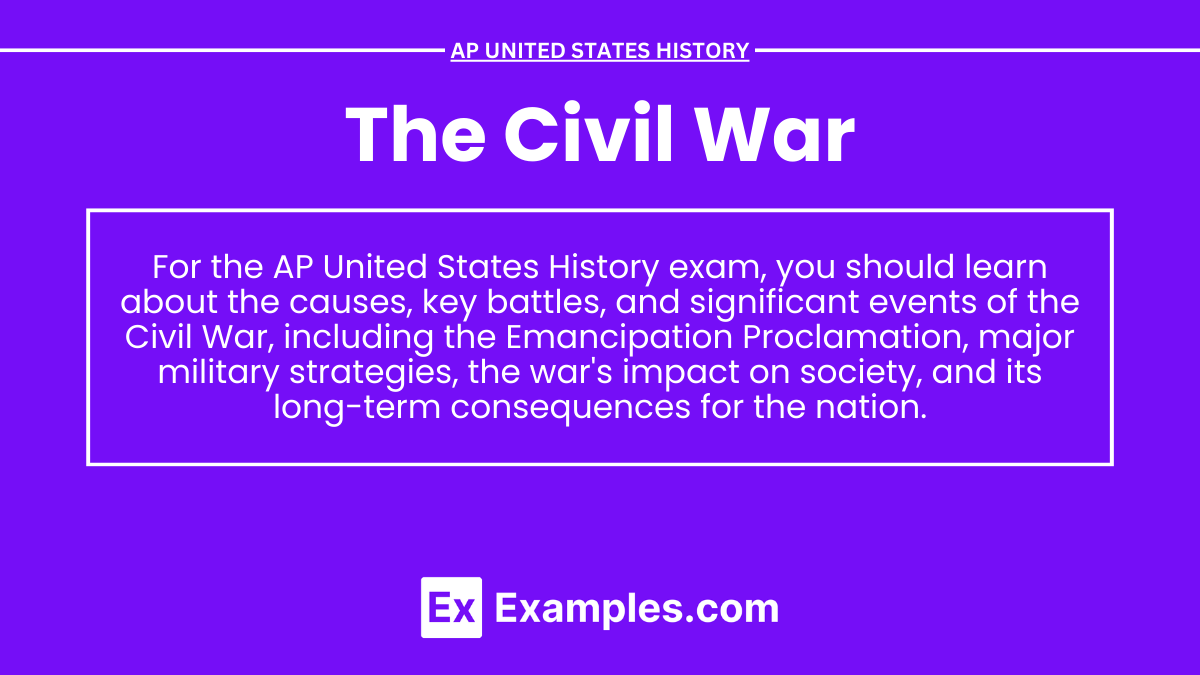In AP United States History, the Civil War (1861-1865) is studied as a defining conflict that arose from deep-seated tensions over slavery, states’ rights, and economic differences between the North and South. The election of Abraham Lincoln in 1860 and the subsequent secession of Southern states led to a brutal and transformative war that ultimately preserved the Union and ended slavery. The Civil War reshaped the nation politically, socially, and economically, laying the foundation for modern America.
Learning Objectives
The learning objectives for the topic “The Civil War” will include the ability to analyze the causes of the war, including slavery, states’ rights, and sectionalism. You will be expected to evaluate key events such as the Battle of Gettysburg, the Emancipation Proclamation, and the surrender at Appomattox Court House. Additionally, you will be required to assess the consequences of the war, including the abolition of slavery, the impact on federal and state power, and the Reconstruction era.
Causes of the Civil War

Slavery: The central issue that divided the North and South was slavery, particularly its expansion into new territories. The South’s economy depended heavily on slavery, while the North increasingly opposed its spread.
States’ Rights: Southern states championed states’ rights, arguing that they had the right to nullify federal laws and secede from the Union to protect their interests, particularly the institution of slavery.
Economic Differences: The industrial North and the agrarian South had different economic interests. The North favored tariffs and internal improvements, while the South opposed these measures, which they felt disadvantaged their economy.
Sectionalism: Over decades, the North and South developed distinct cultural, economic, and political identities, leading to deepening sectional tensions.
Election of 1860: Lincoln’s election was viewed as a threat to slavery and Southern autonomy, prompting the secession of Southern states and the formation of the Confederacy.
Major Events

Fort Sumter (April 12-13, 1861): The Civil War began when Confederate forces fired on Fort Sumter in Charleston, South Carolina. The fort’s surrender marked the start of open hostilities between the North and South.
Battle of Antietam (September 17, 1862): The bloodiest single day in American history, Antietam was a Union victory that halted Lee’s invasion of the North and gave Lincoln the opportunity to issue the Emancipation Proclamation.
Emancipation Proclamation (January 1, 1863): Issued by President Lincoln, it declared that all enslaved people in Confederate-held territory were free. While it did not immediately free all enslaved people, it fundamentally changed the nature of the war and made abolition a central goal.
Battle of Gettysburg (July 1-3, 1863): A turning point in the war, this Union victory ended Lee’s second invasion of the North and marked the beginning of the Confederacy’s decline.
Surrender at Appomattox Court House (April 9, 1865): General Robert E. Lee’s surrender to General Ulysses S. Grant effectively ended the Civil War. The terms of surrender were generous, aiming to reunite the nation peacefully.
Consequences

Abolition of Slavery: The 13th Amendment, ratified in 1865, abolished slavery in the United States, fulfilling one of the war’s primary objectives.
Reconstruction: The post-war period focused on rebuilding the South and integrating formerly enslaved people into American society, though it faced significant resistance and challenges.
Federal vs. State Power: The war resolved the debate over states’ rights, firmly establishing the supremacy of the federal government.
Economic Transformation: The war accelerated industrialization in the North and devastated the Southern economy, leading to significant changes in American economic life.
Casualties and Impact: The Civil War was the deadliest conflict in American history, with over 600,000 soldiers dead and countless others wounded or displaced. The war left lasting scars on the nation.
Examples
- Emancipation Proclamation: Changed the war’s purpose, making the abolition of slavery a key Union goal and discouraging European intervention on behalf of the Confederacy.
- Gettysburg Address: Lincoln’s speech at Gettysburg reaffirmed the principles of liberty and equality, redefining the Civil War as a struggle for a “new birth of freedom.”
- Sherman’s March to the Sea: General William T. Sherman’s campaign through Georgia aimed to cripple the South’s war effort by destroying its infrastructure and resources.
- Lincoln’s Second Inaugural Address: Lincoln called for “malice toward none” and “charity for all,” emphasizing reconciliation and healing after the war.
- Appomattox Court House: The surrender of Lee’s army marked the end of the Civil War, with Grant’s generous terms setting the tone for Reconstruction.
MCQs
- Which event marked the official start of the Civil War?
- A) The Battle of Gettysburg
- B) The Battle of Fort Sumter
- C) The Emancipation Proclamation
- D) The Surrender at Appomattox Court House
- Answer: B) The Battle of Fort Sumter
- Explanation: The Civil War officially began when Confederate forces fired on Fort Sumter in April 1861, leading to its surrender and sparking open conflict between the North and South.
- What was the significance of the Emancipation Proclamation?
- A) It immediately freed all enslaved people in the United States.
- B) It declared freedom for enslaved people in Confederate-held territory.
- C) It ended the Civil War.
- D) It allowed Southern states to secede peacefully.
- Answer: B) It declared freedom for enslaved people in Confederate-held territory.
- Explanation: The Emancipation Proclamation, issued by Lincoln in 1863, declared that enslaved people in areas under Confederate control were free, changing the war’s focus to include the abolition of slavery.
- Which battle is considered the turning point of the Civil War?
- A) The Battle of Antietam
- B) The Battle of Bull Run
- C) The Battle of Gettysburg
- D) The Battle of Shiloh
- Answer: C) The Battle of Gettysburg
- Explanation: The Battle of Gettysburg, fought in July 1863, is considered the turning point of the Civil War because it ended Robert E. Lee’s invasion of the North and marked the beginning of the Confederacy’s decline.


